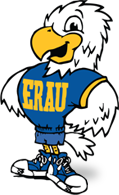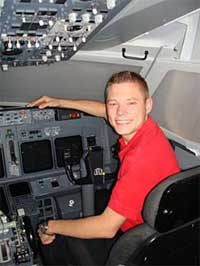 Hello everyone, it feels so good to be back at school and getting into the swing of things. This year is going to be filled with fun and excitement, as well as knowledge that will help me succeed in many years to come. I am finishing up my last year in college and teaching young students the wonderful world of flight, what more can I ask for? I love my life!
Hello everyone, it feels so good to be back at school and getting into the swing of things. This year is going to be filled with fun and excitement, as well as knowledge that will help me succeed in many years to come. I am finishing up my last year in college and teaching young students the wonderful world of flight, what more can I ask for? I love my life!
As a senior here at Embry-Riddle, I have already taken all of my general education classes, as well as most of my Aeronautical Science/Flight courses. Because of the fact that I received my private pilot license before I came to Embry-Riddle, I was able to obtain all of my pilot’s licenses by my junior year. This has allowed me to focus on my class work and gain an abundance of knowledge from teaching others how to fly. What an experience! This past year has been very rewarding, and I look forward to what my senior year will unfold.
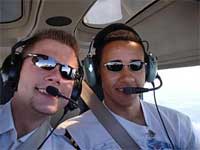 This semester, I am taking my last five Aeronautical Science classes. It’s going to be a blast! These are the capstone classes of the program and they will provide me with the knowledge I will need to succeed in the professional aviation environment. These classes include Airline Dispatch, Aviation Safety, Flight Management Systems, Crew Resource Management, and Flight Technique and Analysis.
This semester, I am taking my last five Aeronautical Science classes. It’s going to be a blast! These are the capstone classes of the program and they will provide me with the knowledge I will need to succeed in the professional aviation environment. These classes include Airline Dispatch, Aviation Safety, Flight Management Systems, Crew Resource Management, and Flight Technique and Analysis.
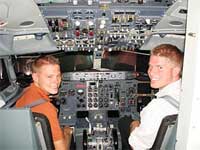 Airline Dispatch is the capstone course for a program we have at Embry-Riddle known as the dispatcher program. A dispatcher is someone that works for an airline who prepares all of the paperwork for a flight. Some of the paperwork includes the route of flight, a review of the weather along the flight, and filling out a flight plan. This is something great for a pilot to have, because if he/she is working for an airline and is suddenly unable to fly, you can turn to your dispatcher certificate. This is a great back-up plan to have in your pocket in the aviation industry. I have really enjoyed this program and it is very enlightening. Most of the required courses are already built into the Aeronautical Science program. You only have to take a few required electives to qualify to take the dispatcher exam. If any you are interested, see your academic advisor for details.
Airline Dispatch is the capstone course for a program we have at Embry-Riddle known as the dispatcher program. A dispatcher is someone that works for an airline who prepares all of the paperwork for a flight. Some of the paperwork includes the route of flight, a review of the weather along the flight, and filling out a flight plan. This is something great for a pilot to have, because if he/she is working for an airline and is suddenly unable to fly, you can turn to your dispatcher certificate. This is a great back-up plan to have in your pocket in the aviation industry. I have really enjoyed this program and it is very enlightening. Most of the required courses are already built into the Aeronautical Science program. You only have to take a few required electives to qualify to take the dispatcher exam. If any you are interested, see your academic advisor for details.
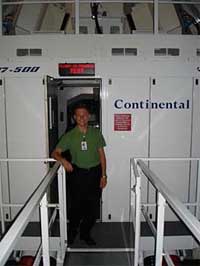 My next class is Aviation Safety. All I can say is WOW! Our professor was a Marine and Naval aviator with thousands of hours of fighter experience. He also flew F-4 phantoms in Top Gun! The stories he shares with the class are truly amazing, especially how he can relate it back to the subject matter. This is definitely one of my favorite classes here at Riddle. In Aviation Safety, we investigate previous accidents and talk about how to prevent them in the future. I look forward to what I will learn this semester from others mistakes.
My next class is Aviation Safety. All I can say is WOW! Our professor was a Marine and Naval aviator with thousands of hours of fighter experience. He also flew F-4 phantoms in Top Gun! The stories he shares with the class are truly amazing, especially how he can relate it back to the subject matter. This is definitely one of my favorite classes here at Riddle. In Aviation Safety, we investigate previous accidents and talk about how to prevent them in the future. I look forward to what I will learn this semester from others mistakes.
Flight Management Systems is also a very interesting class. Here we learn how to operate all of the computer systems and autopilot in a Boeing 747-400. It is truly amazing how accurate the Aerosim program is to programming a real 747-400’s computers. We practice loading routes of flight into the system and flying simulated flights using the autopilot. Since most of the airline and corporate world is operated using autopilot, this is a very valuable skill to have.
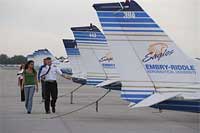 Another useful skill I will learn this semester is how to fly an aircraft in a two pilot cockpit. Crew Resource Management teaches us the special skill of how to work together and provide the passengers with a safe flying environment. General aviation pilots need this training because we are used to operating an aircraft that requires one pilot. This skill works great in small aircraft, but once you begin flying large transport category aircraft, the workload in the cockpit increases tremendously. Therefore, you need to know how to divide up the duties in the cockpit in a safe, yet efficient manner. This class is going to provide me with this skill.
Another useful skill I will learn this semester is how to fly an aircraft in a two pilot cockpit. Crew Resource Management teaches us the special skill of how to work together and provide the passengers with a safe flying environment. General aviation pilots need this training because we are used to operating an aircraft that requires one pilot. This skill works great in small aircraft, but once you begin flying large transport category aircraft, the workload in the cockpit increases tremendously. Therefore, you need to know how to divide up the duties in the cockpit in a safe, yet efficient manner. This class is going to provide me with this skill.
Finally, the last course I am taking this semester is Flight Technique and Analysis. This course is the capstone course of the entire Aeronautical Science program. It takes everything I have learned over the past 3 years and ties it together into one. We use the Aerosim program just like FMS, except we perform actual flight scenarios in a crew environment. We learn how to deal with emergencies, weather, and passenger problems. The flights that we will fly are identical to scenarios an airline would present to their new hire pilots. I am very excited to see how this course will tie everything together, and provide me with a means to succeed in the real world.
As the semester continues I will give you an update on each class and talk more about the wonderful world of flight instructing. Until then, stay motivated, work hard, and fly safe!


